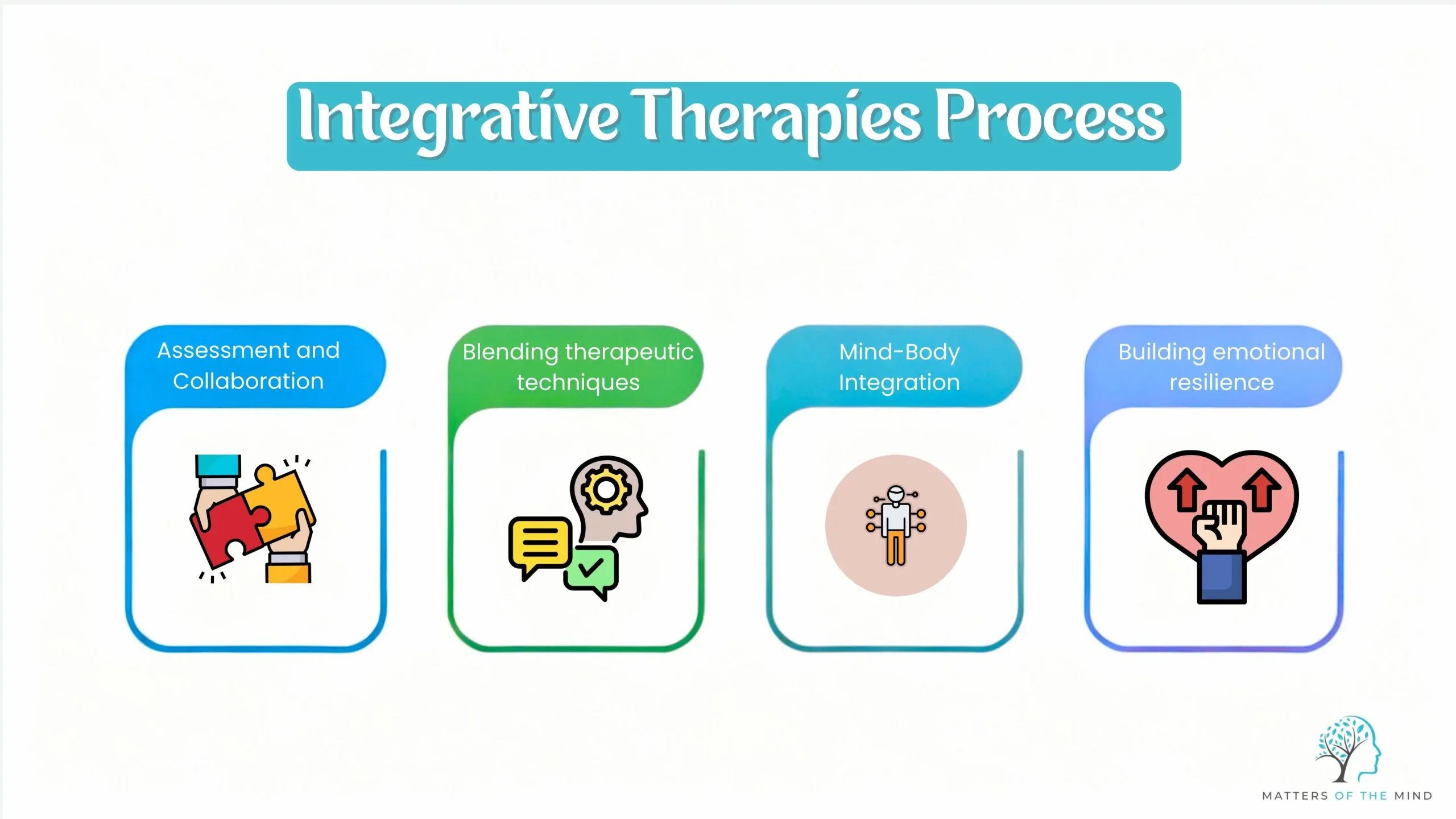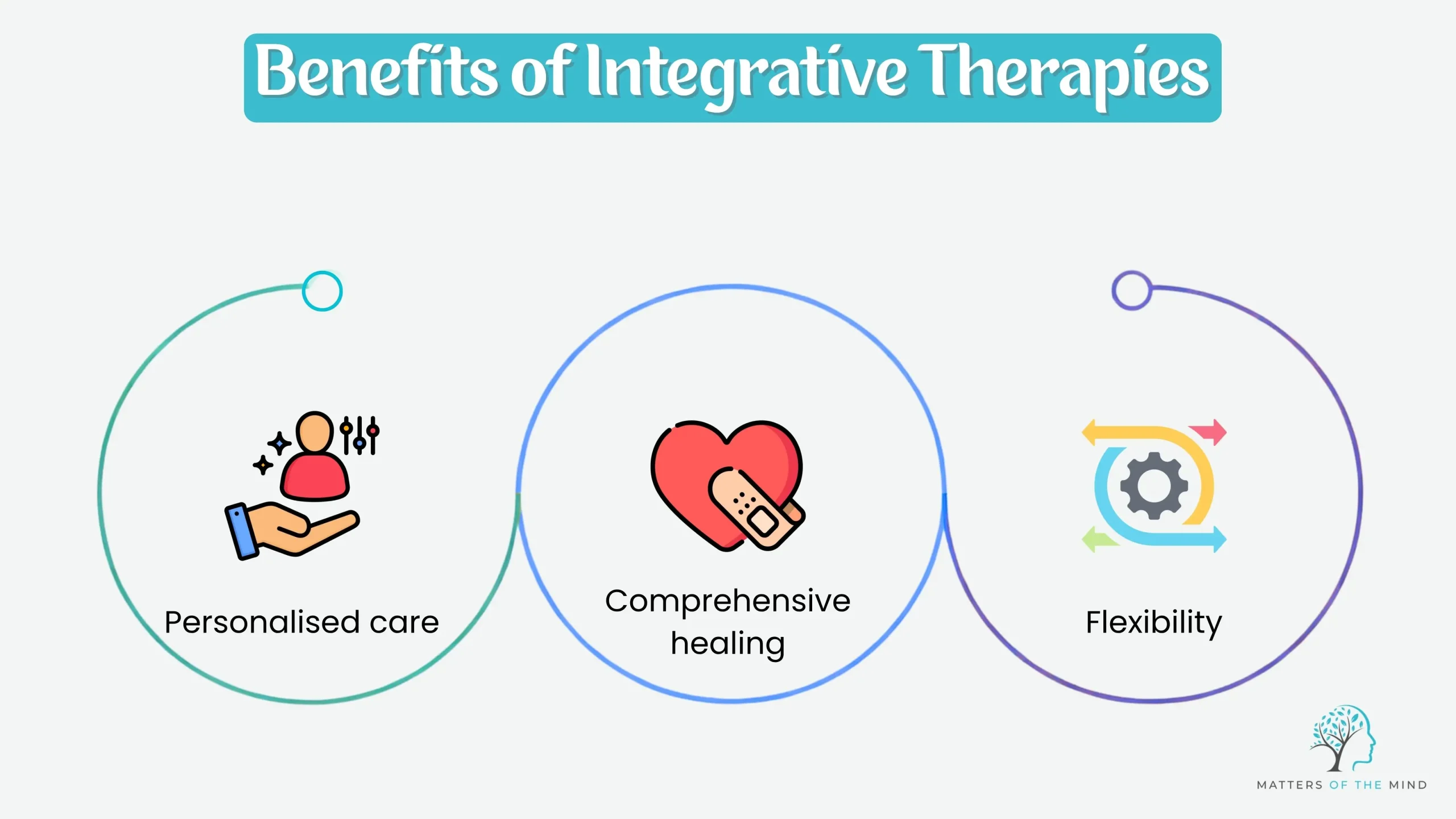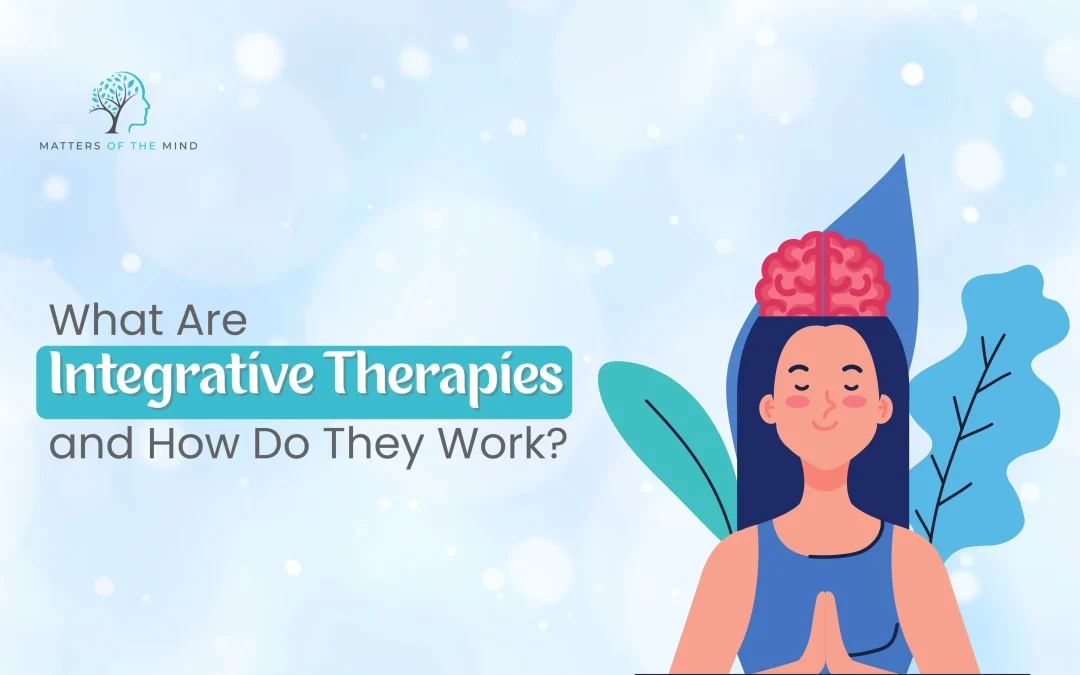There are times in life when an individual feels out of sync, when thoughts, emotions, and body seem to move in different directions. An individual might understand what’s troubling us on one level, yet still feel weighed down by something deeper than words alone can explain. Healing in those moments rarely follows a straight line. It requires patience, self-awareness, and often a blend of approaches that meet us where we are.
That’s where integrative therapies can help. Rather than relying on a single method or rigid framework, this approach recognises that every individual’s journey is different. This approach weaves together various evidence-based psychological techniques and complementary practices to support the mind, body, and emotions as one whole.
By embracing flexibility and personalisation, integrative therapy helps create a path towards balance, honouring the person we are.
In this blog, we’ll delve deeper into what integrative therapies are and how they work to promote an individual’s well-being.
Understanding Integrative Therapies
Integrative therapy is a flexible and inclusive approach that draws on multiple theories and techniques such as Cognitive Behavioural Therapy (CBT), Psychodynamic Therapy, and Mindfulness-based approaches.
Instead of strictly adhering to one framework, the therapist carefully selects a method that best aligns with a person’s individual needs, life experiences, and goals. This personalisation makes integrative therapy especially effective for individuals whose problems don’t fit properly into one diagnostic category.
In essence, integrative therapies aim to treat the person, not just the symptoms. They consider emotional patterns, thought processes, body awareness, relationships, and even lifestyle choices that influence mental well-being.
The Philosophy Behind Integrative Therapy
The foundation of integrative therapy rests on the understanding that no single therapy can capture the full complexity of human experience. Emotional distress often arises from a mix of psychological, social, and biological factors, and healing requires addressing them in harmony.
This approach promotes self-awareness, balance, and adaptability. It encourages individuals to understand not only why they feel or behave in certain ways, but also how they respond differently to life’s challenges.
How Integrative Therapies Work
Here’s how integrative therapies blend to provide an individual a better well-being.

1. Assessment and Collaboration
The process usually begins with a detailed assessment to understand the individual’s background, emotional concerns, and personal goals. This stage sets the tone for a collaborative relationship where the client’s experience, insights, and preferences shape the direction of therapy. The therapist works collectively with the individual, ensuring the creation of a safe, empathetic space for reflection and personal growth.
2. Blending therapeutic techniques
An integrative approach combines elements from different models, such as:
- Cognitive and behavioural techniques: To identify unhelpful thought patterns and build healthier coping mechanisms.
- Person-centric approaches: Involves nurturing self-acceptance, authenticity, and self-growth.
- Psychodynamic exploration: To uncover underlying emotional conflicts and unresolved experiences from the past.
- Mindfulness practice: To help individuals reconnect with the present moment and their physical sensations.
- Relational techniques: To enhance emotional expression and build more fulfilling connections with others.
By weaving these methods together, the therapist ensures that the process remains dynamic, responsive, and aligned with the client’s evolving needs.
3. Mind-Body Integration
A key aspect of integrative therapies is recognising the connection between the mind and body?. Emotional distress often manifests through physical symptoms such as tension, fatigue, headaches, or digestive issues. Similarly, physical health challenges can affect mood, sleep, and resilience.
Integrative therapy may incorporate mindfulness practices, breathing techniques, or relaxation techniques to support physical regulation and emotional well-being. The goal is to bring harmony between mental, physical, and emotional states, and allow the person to experience peace with a healthier well-being.
4. Building emotional resilience
Through reflection, self-awareness, and skill-building, integrative therapy helps individuals develop resilience, the ability to adapt and recover from abilities. Over time, individuals learn to approach their thoughts and emotions with curiosity rather than judgment.
This shift fosters emotional flexibility and a greater sense of inner stability, which can be particularly beneficial for managing anxiety, depression, relationship difficulties, trauma, or stress-related conditions.
Benefits of Integrative Therapies
Some of the key benefits include:

- Personalised care: Every therapy plan is designed to match the individual’s unique personality, history, and goals.
- Comprehensive healing: It addresses emotional, cognitive, behavioural, and physical aspects of well-being.
- Flexibility: Techniques can evolve as the individual progresses, ensuring therapy remains relevant and effective.
Because of this, integrative therapy often resonates with individuals who value a balanced, compassionate, and evidence-informed approach to emotional well-being.
When To Consider Integrative Therapy
Integrative therapy can be beneficial for a wide range of challenges, including:
- Anxiety, stress, burnout
- Depression or low mood
- Relationship difficulties
- Unresolved trauma or loss
- Self-esteem and identity concerns
- Personal growth and life transitions
It’s also a meaningful approach for those who have tried other therapies and are seeking a more holistic and tailored experience.
The Path Towards A Better Well-Being
Ultimately, integrative therapies are about restoring balance between mind and body through the past and present. They offer a compassionate path toward self-understanding, healing, and growth. Through this approach, individuals can move beyond symptom management and cultivate a lasting emotional well-being grounded in awareness, authenticity, and self-compassion.
Final Thoughts
Healing is a deeply personal process, and it unfolds differently for every individual. There is no single path or fixed formula that works for everyone. Integrative therapies help this by being a flexible, compassionate, and evidence-informed approach that adapts to unique needs and experiences.
By drawing from different therapeutic approaches and focusing on the connection between mind, body, and emotion, integrative therapies encourage a healing form of therapy that actually helps to maintain a long and sustainable well-being.
Ultimately, it reminds us that growth doesn’t happen by erasing our pain but by understanding it, learning from it, and gently integrating every part of ourselves into a more balanced whole.
However, sometimes, the first step toward healing is simply reaching out. Dr Kavita Deepak-Knights offers personalised psychological sessions designed to help individuals reconnect with their inner balance and wellbeing. Through an integrative and compassionate approach, she supports clients in understanding their emotions, developing resilience, and creating meaningful change.
Book a personalised consultation today and begin your journey toward emotional clarity and calm.



